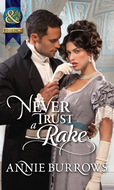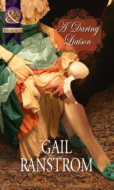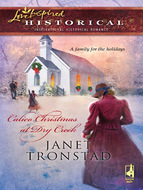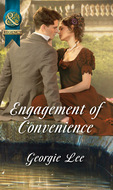Kitap dosya olarak indirilemez ancak uygulamamız üzerinden veya online olarak web sitemizden okunabilir.
Kitabı oku: «A Dangerous Undertaking», sayfa 3
‘And what do I have to do in return?’
‘Be a dutiful wife in the eyes of the world, at least while my grandmother is alive. After that——’ he shrugged—you may annul the marriage if you wish, so long as it has lasted at least a year. You will be amply recompensed in that event.’ He did not know how difficult an annulment would be, but, as he did not anticipate having to put it to the test, it was an easy thing to suggest.
She understood that the marriage was not to be consummated. It seemed extraordinary that he should not want an heir. And what significance was there in stipulating a year? ‘My lord, this conversation is becoming nonsensical,’ she said.
‘It will make more sense if you think about it,’ he said. ‘Do not dismiss my proposal out of hand and, as it looks as though you might be snowed up here for a little while, perhaps you would do me the courtesy of allowing yourself time to consider it.’
Agreeing to that could do no harm, she decided. ‘Very well, my lord. I will think about it.’
He smiled and returned to the table. ‘Thank you, but I must ask you to maintain the masquerade for my grandmother’s sake when you meet her.’
She was his guest, and an impoverished one at that; she agreed reluctantly. She didn’t see how deceiving Lady Pargeter would be any help at all if the marriage never took place. He was so willing to lie that she supposed he would soon invent a story of a lovers’ tiff and the engagement being all over.
She met her ladyship at dinner, which was taken at three in the afternoon, but, even as early as that, it was almost dark and the long dining-room was bathed in the glow of several chandeliers.
Physically Lady Pargeter was a tiny, very frail woman who had to be helped to her chair, but mentally, Margaret was sure, she was strong as iron and just as unbending. She wore a white powdered wig with a cap trailing ribbons sitting on top of it. Her undress gown of patterned silk flowed in pleats from an embroidered yoke, which did little to disguise the fact that she was little more than skin over bone. Her face did not look painted, although it was chalk-white and the cheeks sunken. But her brown eyes were alive, darting about the room, taking everything in, missing nothing. She lifted the lorgnette which dangled from a ribbon on her wrist and peered through it at Margaret.
‘So,’ she said, when everyone was seated and the silent footmen began to serve the meal, ‘are you my grandson’s choice or is he yours?’
Margaret did not know what to say, but before she could think of a suitable reply Roland came to her rescue. ‘It was mutual, Grandmama.’
He had changed into a lilac satin coat over a long embroidered waistcoat. His white breeches were tied with a bow below the knee. Pristine white ruffles adorned his throat and wrists and white stockings graced his elegant calves. He wore a powdered wig with side-curls and ringlets tied at the back with a black ribbon. He looked very stylish, but Margaret found herself thinking that she liked him best in plain country clothes which seemed to suit his muscular physique better. She blushed suddenly when she realised he was looking at her. Could he possibly have read her thoughts?
‘Do you know what you are letting yourself in for?’ Lady Pargeter demanded of Margaret, ignoring her grandson.
‘I think so, my lady.’
‘Good, because I wouldn’t want you to be under any illusions. Being married to a Pargeter heir is a dangerous undertaking, especially for a Capitain.’ She looked venomously at Margaret. ‘Did your mother never tell you that?’
‘No, she never mentioned Winterford at all, not until…until the day she died.’
‘Hardly to be wondered at.’
‘Grandmama, you are making something of nothing,’ Roland put in before Margaret could ask what she meant. ‘We will hear no more of it. Tell me, what have you been doing today?’
‘What is there to do in this God-forsaken place? Hannah read to me a little while and I worked on my needlepoint, but my eyes are not good enough for that now. I don’t know why I continue with it. Obstinacy, I suppose. I do not like being beaten. Oh, and I sat for a time looking out of my window.’ She gave a cackle of a laugh. ‘A wonderful view I have from my window—nothing to behold but the horizon and the sky.’
‘The sky is very beautiful,’ Margaret said. ‘I never realised it until yesterday.’
‘I did see something today, though,’ the old lady went on, ignoring Margaret’s comment. ‘I saw a woman in a rowing-boat, coming upriver from that…that place. She stopped at our jetty.’
Kate giggled and Charles said, ‘I didn’t see anyone, did you, Roland?’
‘At our jetty?’ he queried. ‘No, I did not.’
‘It’s funny she should turn up again,’ the old lady said, peering at Margaret. ‘You have a look of her…’
‘No, she hasn’t,’ said Roland quickly. ‘Mistress Donnington is nothing like her. And it was years ago, Grandmama…’
‘Is it? Oh, time means nothing to me now. Sometimes it drags, and weeks seem like years, and sometimes it is the other way round.’ She sighed. ‘What it is to be old. Everybody standing about waiting for you to die.’
‘Rubbish!’ said Roland.
‘Oh, Grandmama!’ said Kate. ‘You must not talk like that.’
‘Why not? I am long past the age when I should be in my coffin. My daughter-in-law has been dead these many years and now my son is gone. Why have I been left behind?’
‘Because we love you and do not want to part with you,’ Kate said.
‘There’s more to it than that,’ she said. ‘It has something to do with this young man here.’ And she poked Roland’s arm with her lorgnette. ‘I have been preserved, pickled in wine and brandy, simply in order to see the Pargeters with a new heir. I shall go to my grave in peace when that happens.’
Roland looked at Margaret as if defying her to deny the possibility. She concentrated on her plate, picking without appetite at fish in oyster sauce. What was going on? They were all talking in riddles.
‘So, when is the wedding to be?’ her ladyship continued. ‘I think it should be soon.’
‘But I am in mourning, my lady,’ Margaret put in, reluctant to talk of a marriage she never intended should take place, but she remembered just in time Roland’s warning to humour the old lady. Arguing with her might bring on a seizure. ‘My mother died less than two weeks ago.’
‘Where?’
‘In London.’
‘Your father? Was he one of the Donningtons of Devon?’
‘I don’t think so, my lady. He died when I was very small. In India.’
‘Oh, a merchant!’ There was contempt in her ladyship’s voice, and Margaret was tempted to defend the father she had never known, but changed her mind.
‘I believe so.’
‘Was he successful?’
Margaret forced herself to smile. ‘If he had been, I would not be here now.’
It was not an answer which pleased her ladyship. She drew her lips down into a thin line and tapped Margaret impatiently on the back of her hand with her fan. ‘My grandson honours you, and you would do well to remember it.’
‘Indeed, I do, my lady.’
‘Good. Have you any other kin, besides that reprobate Henry Capitain?’
‘I know of no one, my lady.’
‘Then who is there to complain if you marry while you are in mourning?’ She turned to her grandson. ‘I want it done and I want it done quickly. I have no time to waste, even if you think you have. And you haven’t, you know. Twenty-six and still single. You are not even a widower, which might excuse you.’
‘Oh, I say,’ Charles broke in.
‘I call spade a spade,’ she said. ‘And we all know it sometimes takes two marriages to produce an heir.’
Margaret was perplexed. ‘What does she mean?’ she whispered to Roland, who sat next to her.
‘My father’s first wife died in a fall from a horse soon after they married, and they had no children,’ he answered in an undertone. ‘My sister and I are the result of his second marriage. Grandmama is a little confused; she sometimes relives these little dramas. Pay no heed.’
The meal ended silently. It was as if the old lady’s talk of death had put a constraint on them all, and Margaret was glad when it was over and her ladyship rose to leave the table. Hannah, the old lady’s companion, who had shared the meal but not the conversation, was immediately at her side to help her to her room, leaving Kate and Margaret to go to the withdrawing-room together.
‘Oh, I am so glad you came,’ Kate told Margaret. ‘It gets dreadfully dull here sometimes.’
‘What do you do for amusement?’ Margaret asked her.
‘Sometimes we go to Cambridge or to the races at Newmarket. And there is always the fen.’
‘The fen?’
‘Boating and fishing and wildfowling. I don’t shoot, of course, but Roland is a crack shot, and Charles nearly as good. It isn’t surprising when you consider they both served with distinction in the army. They were in the same regiment—did you know that?’
‘No,’ Margaret said, choosing her words carefully. ‘His lordship and I had very little time to get to know each other. I had to nurse Mama.’
‘Of course, I understand. But you must think of the future now.’
Margaret didn’t want to think about it. ‘Tell me about yourself,’ she said.
‘Roland is eight years older than I am, you know. I believe my mother had several miscarriages between the two of us. I don’t remember her, but Roland says Papa was so delighted to have a daughter after so long, he spoiled me dreadfully.’ Her voice became sad as she added, ‘He died five months ago. Roland was missing at the time—it was just after the battle at Culloden—and we did not know what had happened to him. It was only when Charles got leave in the summer and came to tell us Roland had been wounded, and was being cared for by the Chalfonts in Derbyshire, that we knew he was alive. As soon as he was well enough to travel he returned to his regiment, and then of course he learned of Papa’s death and came straight home to take up his inheritance.’ She laughed lightly. ‘You know, sometimes he treats me like a daughter instead of a sister. He can be very pompous when he chooses.’
‘Yes, I can imagine that,’ Margaret said with a wry smile.
‘But you are not at all haughty and you will not treat me like a child, will you, even when you marry Roland? After all, you cannot be much older than I am.’
‘I am nineteen.’ She knew that she would soon be past marriageable age, especially as she had no dowry, but that didn’t mean she was desperate. ‘But I have not agreed to marry him.’
‘Oh, but you will, won’t you? You will be so good for him, I know you will. I knew it as soon as I saw you. Charles was right; all Roly needed was a little push in the right direction.’
Margaret felt herself being drawn further and further into the web and yet she seemed unable to do anything to free herself, and the longer the charade went on, the more difficult it became to speak out, to say she had no intention of marrying Lord Pargeter. She was about to pluck up her courage to do so, when Roland and Charles joined them.
They had some desultory conversation, and then Roland suggested showing Margaret over the house.
‘Capital notion!’ Charles said, grinning. ‘Kate and I will amuse ourselves with a little piquet. Hannah will be down again directly to chaperon us.’
Margaret followed Roland from the room, determined to tell him she would not fall in with his outrageous scheme. Although it was little past four o’clock it was already quite dark, and he picked up a lamp from the table in the hall and held it aloft. It revealed a vaulted gallery that towered the whole height of the building, panelled and hung with portraits.
‘My ancestors,’ he said, indicating the pictures. ‘The baronetcy was granted by Elizabeth when we lived in Ely and owned land on the higher ground above Winterford. As the fens were drained, so we acquired more. We have been in residence in the Manor since the Commonwealth.’ He led the way up the wide staircase. ‘The house is built in the shape of a crooked E. The staircase forms the central bar and most of the rooms we use are in the west wing, which is more protected from the prevailing wind than the east side.’ They reached the gallery, where they stood side by side, looking over the banister to the vestibule below. It was lit by two lamps near the door, and a huge fire whose warmth did not reach them.
‘Your great-uncle was here,’ he said.
‘Uncle Henry? When?’
‘Last evening. He came looking for you.’
‘How did he know where I was?’
‘One must suppose he guessed.’
‘I did tell him that Master Mellison had been kind enough to escort me to Sedge House,’ she said slowly. ‘What did he say?’
‘Oh, he was full of bluster and talk of abduction and a great deal more.’
‘He thought you had abducted me?’ she queried in surprise. ‘Why, that’s nonsense.’
‘So I told him. He said if I had not abducted you I would have no objection to your returning with him.’
‘What did you say to that?’
‘I said, of course, I had none, but that you were sleeping off the effects of your ordeal, an ordeal brought about by his immoral behaviour, but, if you wished, I would take you to him when you had recovered.’ He paused, turning to face her. ‘Do you wish to go back?’
She thought about it for a moment. Was that what she ought to do? It might get her out of the extraordinary situation she found herself in here at the Manor, but the memory of her uncle’s lecherous guests decided her. ‘No, certainly not. I cannot think why he should think I would. He did not exactly make me welcome.’
‘He said something about the child of his beloved niece and blood being thicker than water. I am afraid that he angered me so much that I became a little indiscreet.’
‘Oh, what did you say?’
‘I cannot repeat the words I used, Mistress Donnington.’ The fury he had felt when he’d seen Capitain shaking the snow off his hat and stamping his booted feet on the hall rug of Winterford Manor had evaporated, leaving him icily calm. Pargeters and Capitains had not spoken to each other for years and, for the most part, ignored one another’s existence; Roland could hardly believe that charlatan could have had the effrontery to call at Winterford Manor and demand to see him. Demand! He had been about to throw him out, when he had realised there was a way to crush him completely. He had told the insolent fellow of his intentions towards Margaret. It had silenced him just long enough for him to comprehend the implications. There had been a great deal more ranting about being Margaret’s legal guardian and his permission being needed for such a step, but that was all it was, nothing but bravado. They had come to an arrangement which guaranteed silence and involved a certain sum of money changing hands. The man would gamble it away in less than a month, but by then the marriage would have taken place. If Roland had had any doubts about the rights and wrongs of what he was doing, they had been dispersed by that visit.
CHAPTER THREE
‘THANK you,’ Margaret said quietly. ‘It was kind of you.’
‘No, it was not!’ Roland sounded almost angry. ‘I am not kind, I am just the reverse. My motives were purely selfish.’
‘Oh,’ she said, understanding. ‘You told him…’
‘That we were to be married, yes.’ His tone had moderated; it would not do to take his anger out on her.
‘Why?’
‘He insisted he was your legal guardian and could force you to return to him. I could not let you go back to him, could I?’ That was true; he could no more have handed her back to that debauched old man than he could have drowned a kitten, and she was homeless and penniless, but did that mean he had the right to coerce her into marrying him?
‘Thank you, but did you need to go to such lengths?’ She looked at him with her wide violet eyes and made him feel a hundred times worse. ‘Now it is not only your grandmother who is being deceived, but my uncle too.’
‘There need be no deception. You said you would think about my proposal…’
‘I have considered it very carefully, my lord, and I am very conscious of the honour you do me, but the answer must be no.’
‘Why? Are you nursing dreams of falling in love, Mistress Donnington? I assure you it is a fantasy that only marriages based on love are successful.’ He paused, hardening his heart. ‘Do you want me to hand you over to your great-uncle? I believe he has plans for you…’
‘What kind of plans?’
‘Need I go into detail? You saw his paramour and his guests…’ He shrugged, leaving her to imagine the worst. ‘The choice is yours.’
‘I can go back where I came from.’
‘Do you have enough money to pay the coach fare, find lodgings and keep yourself until you find work suitable for a gentlewoman?’
‘No,’ she said slowly. ‘I wonder, would you be kind enough to lend me——?’
‘No, it will not serve.’
‘You are despicable!’
He laughed. She was angry again, but anger became her, made her eyes sparkle and colour flood her cheeks. He had to grit his teeth to go on. ‘No, simply practical. Don’t you see, it would be the answer to both our dilemmas? I promise you I will do everything to make your life here as agreeable as possible.’ He meant that, every word of it. ‘Is such a prospect so dreadful?’
She did not answer immediately because a little imp inside her was telling her that she could grow to like the idea. He was handsome and courteous, if you ignored his bouts of ill-humour, and they soon passed. And maybe it was simply that he could not understand her reluctance. Why was she so reluctant? Could it be that he was right and she had been fantasising about falling in love? She ought to know better than that; she had not been so carefully nurtured that she did not know anything about the real world. You could not live and work in London and remain ignorant of it. She should be glad she did not have to return to that world, where she might end up like Nellie, desperate enough to consent to anything.
Seeing her hesitation, he gave a twisted smile. ‘I promised to free you at the end of a year and, God willing we both survive, I shall keep that promise. And I will make sure you have a dowry, enough to seek out the man you believe you are destined to fall in love with. I will not stand in your way.’
‘Why a year?’ she asked, curious in spite of herself.
‘It will soon pass,’ he said, evading her question. ‘And I will not trouble you with my presence. I have to go back to London almost immediately and shall not return except very occasionally, when I come home to see that all is well and pay my respects to Grandmama.’
‘Why?’ she asked again.
‘I have my reasons.’ His tone was clipped.
She turned to look into his face, dimly lit by the lamp he held, trying to search out answers he did not seem to be able to voice. What sort of man was he, that he could so cold-bloodedly talk of ending a marriage before it had even begun? Unfeeling in the extreme, she decided, a man with no warmth. And yet there were times when there was a light in his eyes which revealed humour and vitality, and there was about him a suppressed energy which excited her. She could so easily fall under his spell.
He returned her gaze, hating himself. She was helpless, forced to ponder on the imponderable because of her circumstances. And she was beautiful, something which had not been evident when he had first seen her in the White Hart; she had a clear skin which had never been spoilt by paint, huge, expressive eyes which seemed to bore into his very soul, a mouth made for kissing, and a determined chin. Life with her would not be dull. If she had been anyone but a Capitain, he would have retracted, given her money to go wherever she wished and put her from his mind. It was all Charles’s fault. No, he chided himself, he should not blame Charles. He had done nothing but put the idea into his head. Charles had not been the one to lead Lady Pargeter to believe he would marry Margaret; he had done it himself. Lies! Could she see that in his eyes?
‘Very well,’ she said quietly. ‘I accept your terms.’
‘Good.’ He smiled briefly as he took her arm to guide her along the gallery.
She was not sure if it was the touch of his hand or a feeling of foreboding which made her shudder. She did not know why she should be apprehensive—perhaps it was because marriage was something she had not even been considering forty-eight hours before, perhaps it was the cavernous entrance hall with its upper gallery and dark corners where no lamp could reach, or perhaps it was just the weather, which imprisoned everyone, whether they willed it or not.
‘You are shivering,’ he said. ‘Are you cold?’
‘A little.’
He put the lamp on a chair and took off his coat to drape it round her shoulders. His touch was gentle and his breath was warm on her cheek as he bent to draw the coat close under her chin. She looked up and their eyes met and held, his dark and brooding, hers bright with tears which she did not know why she was shedding. It was as if both were searching for knowledge, for reassurance, for hope. He lowered his head, drawing closer, his mouth only inches from hers. She waited, trembling like a frightened bird beneath his hands.
‘No,’ he murmured, and drew away.
‘No?’ She could hardly speak for the tumult in her breast.
‘You are cold. I think we should postpone the rest of our tour for another time.’
‘Yes,’ she said, bewildered by his strange behaviour. He had proposed, in the coldest fashion possible, a marriage of convenience and then had warmed sufficiently to behave like a prospective husband and kiss her, and then decided against it. Ice; he was made of ice. And fire.
He picked up the lamp again and escorted her to her chamber door. ‘Goodnight, Mistress Donnington.’ He took her hand and bowed over it but he did not lift it to his lips. It was almost as if he was afraid to do so.
She went to bed, her insides churned up by the knowledge that she had wanted him to kiss her, which was foolish in the extreme. She had agreed to his terms and they took no account of feelings, either his or hers. It was not a love-match. Then why was she crying?
He returned downstairs to join Charles and Kate in a childish game of cards which caused them great hilarity but failed to lighten his mood. Kate soon lost patience with him and declared her intention of going to bed. ‘One would think Mistress Donnington had rejected you,’ she said.
‘On the contrary, Mistress Donnington—Margaret—has done me the honour of accepting.’
‘Then smile, for heaven’s sake,’ she said. ‘It should make you happy.’
‘Yes, cheer up, man,’ Charles said. ‘Think of the future.’
Yes, he decided, forcing a smile for their benefit, it was only thinking of Susan and their future that kept him sane.
Kate retired and the men went into the library, where a decanter of good French brandy and glasses had been put out on a small table by the window.
‘There is something you forgot when you thought of this diabolical plan,’ Roland said, pouring drinks. "Marry a complete stranger", you said, but you forgot that when two people are together for any length of time they cannot remain strangers. Even after one day, I have come to know Margaret a little. She is brave and independent and she has a sense of humour that is refreshing. I am sure she can read my guilt in my eyes.’
‘Then stay away from her until the wedding. You are leaving immediately after it, aren’t you?’
‘I had planned to.’
‘What do you mean, planned to? Have you changed your mind?’
‘The weather may prevent it.’ How could he explain to his friend what he did not understand himself, his remorse, so strong that he had been almost tempted to tell Margaret the truth? The only reason he had not done so was because he would lose any respect she might have had for him, and he was surprised to discover how much that mattered to him. He told himself he wanted to see her comfortable and happy in her new home before he left it.
‘It was only an idea, to help you out.’ Charles’s voice broke in on his brooding. ‘You didn’t have to do it.’
‘No, and do you know what decided me? It wasn’t my own predicament; it wasn’t thinking of Susan; it was the sight of that depraved villain, Capitain, standing in my vestibule demanding to have her back. I was furious.’
‘Whatever the reason, it’s done now. If you have any twinges of conscience, just remind yourself of the benefits.’
‘To me, but not to Margaret.’
‘She will have a year of being Lady Pargeter, a year of plenty that most young ladies would give their teeth for, and what she doesn’t know cannot hurt her, can it?’ He paused to take a mouthful of brandy, smiling over his glass at his friend. ‘Besides, she may survive the year. After all, you do not love her and she does not love you, so it won’t count, will it? Nothing will happen. It will all come right in the end and no harm done to anyone. But you really must look happier at the prospect, my friend, or questions will be asked.’
‘I must go to Derbyshire and explain to Susan.’
‘No.’ Charles spoke sharply. ‘It will look decidedly odd.’
‘It will look even odder if I don’t, particularly to her parents. I am sure they were expecting me to offer for her before I left.’
‘Why didn’t you?’
‘I don’t know. The time didn’t seem propitious.’
Charles laughed. ‘You mean you were not sure of your feelings?’
‘Of course I am sure.’
‘Then wait,’ Charles said implacably. ‘The roads are impassable and, you never know, by the spring…’ He stopped and surveyed his friend. ‘Harden your heart, Roland, harden your heart. Think of your true love, think of the Capitains. Don’t all Capitains deserve your hatred?’
‘Yes, by God. If it weren’t for a Capitain, I wouldn’t be in this fix. Here’s a pox to all Capitains.’ He tipped the contents of his glass down his throat and poured himself another and then another, followed by several more until the bottle was empty.
He did not remember staggering up to bed, but he woke in his own room next morning with a blacksmith’s shop in his head. He groaned and sat up. Johnson had laid out a double-breasted velvet coat and buff breeches and there was hot water in the washing bowl. He ignored the clothes, washed, and went to the wardrobe where he found warm wool breeches and thick stockings. He scrambled into them, put on a huge black overcoat which came almost to his ankles, and went downstairs. He passed the open door of the morning-room, where the table bore witness to the fact that everyone else had already breakfasted, and went out into the snow. Perhaps the biting cold would knock some sense into him.
The village, with a few large trees surrounding its green, stood on ground a little higher than the surrounding fen, which meant the inhabitants were rarely troubled by flooding except in very severe weather. There had been fresh falls of snow during the night, which might cause problems when a thaw set in. He dug into the snow with his cane to assess its depth and the amount of water they might expect, then looked back at the house, which was two hundred yards from the cut and about ten feet above its present level. Was ten feet enough if the cut became swollen with melting snow from the hills away to the west? And what about the village itself? The men ought to begin building a barrier now, not waiting until disaster struck.
Putting aside his headache and his impending nuptials, he tramped off over the snow towards the group of clay-lump cottages which stood close to the church.
Unlike Roland, Margaret could not put the forthcoming wedding from her mind. Kate would not cease chattering about it, laughing and making plans, oblivious to the fact that Margaret was not joining in.
‘When is it to be?’ Kate asked as they sat together in one of the smaller sitting-rooms, which was easier to keep warm than the huge drawing-room and had some comfortable upholstered chairs. She had some embroidery in her lap, but she had done no work on it since Margaret had joined her.
‘The twenty-first, four days before Christmas. Her ladyship wants no delay and his lor—Roland agrees with her.’
‘But that’s less than a week away! How can you possibly be ready by then?’
‘It is not difficult. I have no family except Great-Uncle Henry, and there will be no invitations issued, although Roland has said he will invite the villagers to attend the service. They will help to fill the church.’
‘Don’t you mind? A wedding should be a grand affair, a cause for celebration. It is almost as if you are ashamed to have it known.’
‘No, not at all. You forget, I am in mourning.’
‘Oh, yes, I am sorry, Margaret, how thoughtless of me. Does that mean there will be no wedding-trip either?’
Margaret gave a light laugh and was surprised that it sounded so natural. ‘We’ll go nowhere while this weather holds, but later, perhaps, we may go to London. Roland tells me he has business there.’
‘Business!’ Kate gave a grimace of disgust. ‘You know, he really is the dullest man.’
‘Not at all,’ Margaret said, and meant it. Whatever she thought of Roland, she did not find him dull. If only he were not so tense, as if he was deliberately holding himself aloof, he would be an entertaining and charming man. She began to wonder if the fault was with her, but if he found her not to his liking, why had he asked her to marry him? ‘We can combine business with pleasure, surely?’
‘Yes. There will be routs and balls, and no doubt Roland will present you at court. Have you decided what you are going to wear?’
‘To court?’
‘No.’ Kate laughed. ‘At your wedding.’
‘Roland has insisted on buying me a gown. Is there anyone in Ely who could make me one? Nothing extravagant, of course.’
‘There is a dressmaker, but I have rarely been to her.’ Kate sounded doubtful. ‘I usually buy all I need when we are in London.’
Ücretsiz ön izlemeyi tamamladınız.








